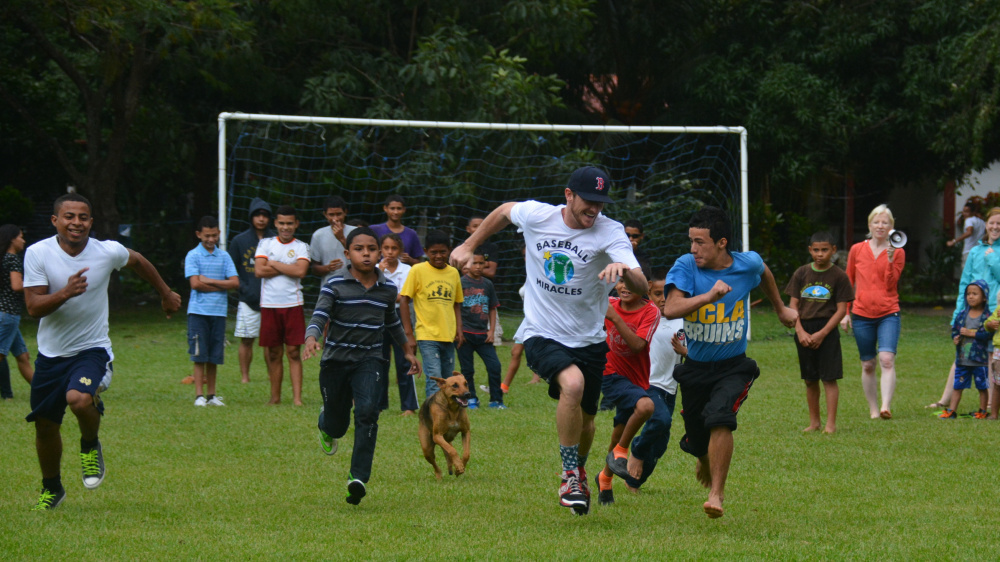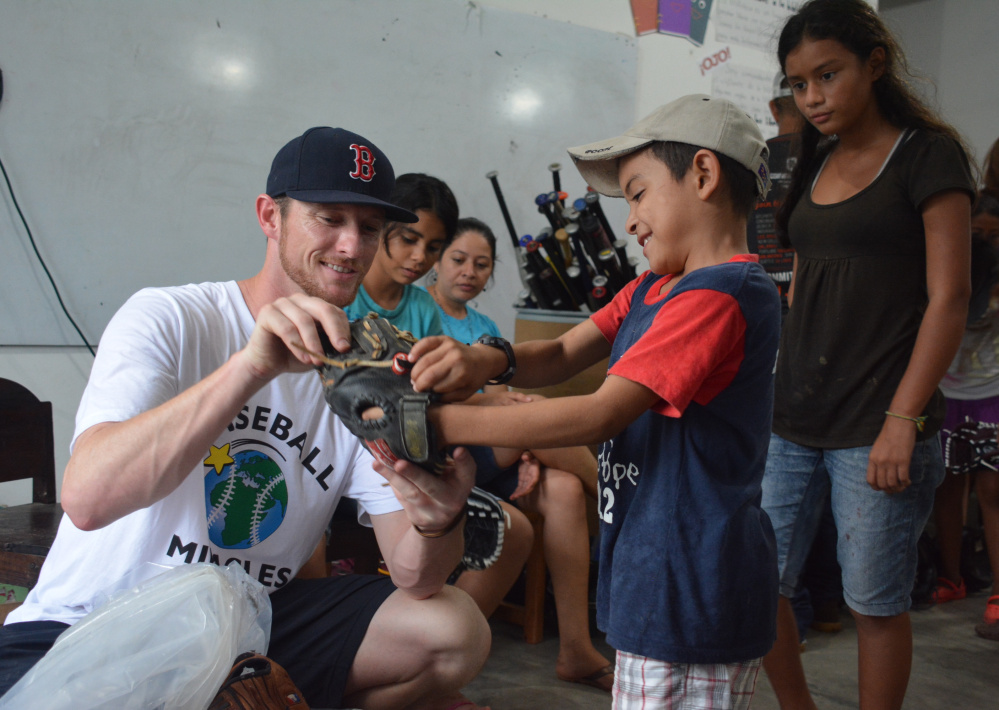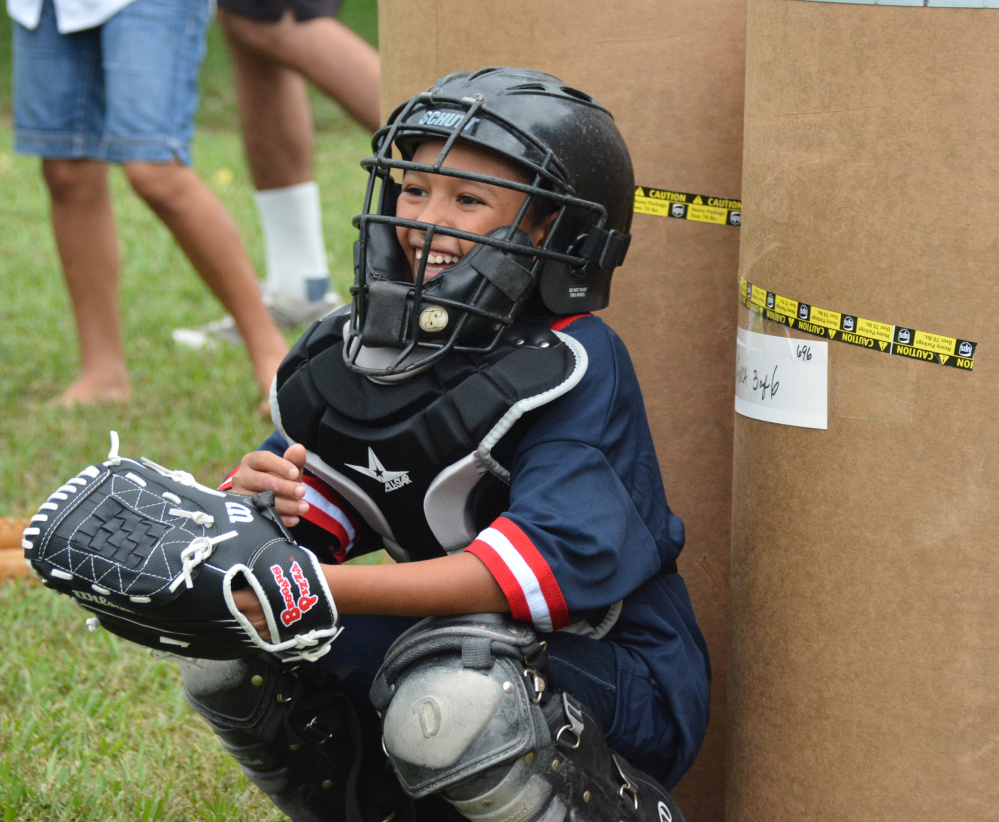“My life is not predicated on baseball but on being the best person I can be.”
Michael McCarthy, Boston Red Sox prospect
Michael McCarthy, who may return to the Sea Dogs, receives by giving.
The little boy growing up in Antioch, California, was too young to tell you about life lessons or theories on overcoming adversity. He just felt alone.
“My parents divorced and the emotional struggle you go through … it meant I depended on a lot of people,” Michael McCarthy said. “And a lot of people stepped into my life and helped.
“My mom struggled with highs and lows in her life. I had coaches who picked me up when they knew she was incapable of it. I had teachers who would lend a kind ear, or put their arm around you and let you know it was going to be all right.”
None of that information is on the back of McCarthy’s baseball card, nor included in the scouting reports of Boston Red Sox minor league players.
But it has more to do with McCarthy than any mention of his fastball velocity or earned-run average.
Baseball is a passion for McCarthy but before he learned how to throw a change-up, he discovered the value of a hand reaching out to offer a lift.
Those hands pulled McCarthy up in his childhood, and soon he was extending his own hand to help others.
In high school, McCarthy worked with disadvantaged kids. His need to serve continued in college and his pro career. McCarthy immerses himself into the towns and cities he plays in – including Portland – while traveling in the offseason with Baseball Miracles, an organization that spreads the joy of baseball to impoverished areas in the United States and abroad.
McCarthy, 28, is in Boston’s minor league spring training camp in Fort Myers, Florida. He has already spent two-plus seasons with the Double-A Portland Sea Dogs in varied roles as a starter and reliever. He may be back at Hadlock Field again – not exactly the fast track to the majors.
“I’m a 28-year-old right-hander who throws 88-90 (mph),” McCarthy said last week. “Nothing jumps out that says ‘major prospect.'”
That blunt self-assessment does not bother McCarthy.
“My life is not predicated on baseball but on being the best person I can be,” he said.
HIGH-FIVES
In high school, McCarthy began reaching out. He has a stepbrother with Asperger’s syndrome and because of that, was attracted to the Best Buddies program, which provides friendships for young people with intellectual and development disabilities.
“Once I started to see how fragile life is and how resilient life can be, it really opened my eyes,” McCarthy said. “I started realizing my voice and my actions can mean much more. That negative energy I was having trouble with early on can be used for good.
“I realized I’m going to go out and benefit the world every day, the best I can.”
In college at Cal State-Bakersfield, McCarthy became president of the student-athlete advisory committee. Instead of just being a liaison for the athletes, the committee devoted itself to service, devising the “Project 3000” program. The goal was for student-athletes and athletic department staff to put in a total of 3,000 service hours to the Bakersfield community.
“It was very rewarding,” McCarthy said.
At Cal State-Bakersfield, McCarthy majored in pre-med. As a small child he was hospitalized with tumors in his mouth. After three procedures, they were removed for good. That had McCarthy thinking about going into oncology.
But McCarthy was also a fine baseball pitcher, with a 1.62 ERA in 2011. His med school thoughts were put on hold when the Red Sox drafted him that year in the 14th round.
By the middle of the 2013 season, McCarthy had reached the Portland Sea Dogs. He was not a big-name prospect but the team’s front office soon discovered him.
After Sunday afternoon home games at Hadlock Field, fans 16 and younger are invited to run the bases. Ushers and front-office personnel organize it all. But on this Sunday, in the summer of 2013, one of the players remained instead of hurrying to the clubhouse.
McCarthy walked over and gave each runner a high-five as they crossed home plate.
“I thought it was fantastic,” Sea Dogs assistant general manager Chris Cameron said. “He’s the only one who ever stayed around. To see a player take the initiative to do that on his own … it was pretty special for the kids.”
The Sea Dogs soon found out just how special McCarthy was.
“He volunteers to sign at the autograph table frequently,” Cameron said. “He makes numerous appearances, speaking at schools, going to camps … almost every community appearance we have, he’s the first to sign up.”
After every season, one Sea Dogs player is chosen citizen of the year for his community involvement. McCarthy has received the award the past two years.
“We are role models every single day,” McCarthy said.
Besides signing up for activities, McCarthy comes up with his own ideas.
While giving a baseball clinic at Hadlock, he looked up at the towering Maine Medical Center down the road and considered the patients in the Barbara Bush Children’s Hospital, high up in the Center.
“I thought we could run a camp at the hospital,” McCarthy said. “They can’t leave the hospital so we’ll bring the game to them.”
Accompanied by Slugger, the Sea Dogs’ mascot, McCarthy brought a net, bat, Whiffle balls, baseballs to sign and catcher’s equipment to try on.
“The kids really enjoyed it,” said Beverly Spares, a child life specialist at Barbara Bush. “He was teaching the kids a batting stance and was handing out balls. It’s really nice to have something like that; it brings (the patients) back to their normal life.
“It went on longer than it was supposed to. Kids kept coming out.”
BASEBALL MIRACLES
What McCarthy did at Barbara Bush – bringing the game to kids – is what he’s been doing across the globe the past three offseasons.
It was three years ago that McCarthy hooked up with Baseball Miracles, an organization devoted to bringing baseball to impoverished areas. Started in 2011 by a Chicago White Sox scout, John Tumminia, Baseball Miracles strives “to teach boys and girls with economic and environmental disadvantages throughout the world. … Our mission is to serve others and see the joy of a child hit and catch a ball for the very first time,” according to the group’s mission statement from its website, baseballmiracles.org.
Baseball Miracles has taught the game to inner-city kids and those on Native American reservations, allowing them to play the game for the first time. McCarthy serves as clinic coordinator for the group.
This offseason the group traveled to South Africa for a second straight year, Kenya and Honduras, as well as Bakersfield.
Everywhere they go, they bring equipment that has been donated – McCarthy annually runs an equipment drive at Hadlock Field – as well as shirts, caps and plenty of instruction. They teach the kids how to play and the adults how to coach.
McCarthy said sites are chosen informally as the group learns of a locale in need and interested.
Many of the locations – including all three foreign spots last year – are orphanages. But other local children are invited. In Kenya they visited an orphanage with 80 residents, but “we ended up working with over 400 kids over a 2½-day span,” he said.
Baseball Miracles staff members receive no financial compensation and raise money to cover their own travel. When they leave a site, the baseball equipment remains.
McCarthy said he often hears the question, “Why baseball?” when these areas could likely use something more tangible.
“We don’t pick out areas in the most dire need of food and shelter,” McCarthy said. “We understand baseball is a discretionary item to survival.
“But sports is about opportunity. Learning teamwork. Learning work ethic and adversity. These kids have passion, energy, and desire to grow and learn.”
Not only does Baseball Miracles teach the local adults how to coach, but it tries to stay in the background as the players learn.
“We end up putting the older kids in charge,” McCarthy said. “We talk about the importance of helping provide guidance for the younger kids. … Once they get going, we want them to learn the game from each other.”
How does the game take hold? When McCarthy visited South Africa the year before, he was teaching the basics – how to put on a glove, the fundamentals of fielding and hitting.
“When we came back (this year), they had the gloves on their hand, ready to take ground balls and batting practice,” McCarthy said. “We were able to start games right away.”
There are challenges, of course, like when it rained throughout their first day in Honduras.
The coaches and kids went inside to use a long hallway and classroom for drills when the electricity went out. They still brought out the equipment in the semi-darkness.
“They put their gloves on and we rolled them grounders,” McCarthy said. “Then one kid was pitching, another catching and the kids are hammering whiffle balls, and having the time of their life. It turned out great.”
Back in Fort Myers, McCarthy said he often shares stories and pictures with his teammates – extracting a sense of gratitude. He also keeps in touch with several kids he’s met, continuing as a long-distance mentor.
What will he do when the baseball season begins? That depends where the Red Sox send him. If it’s Portland, McCarthy is sure to volunteer at his old haunts while taking some time at his favorite spots – the Old Port, Eastern Promenade and Bradbury Mountain, with a day trip reserved for Acadia National Park, maybe a hike of Katahdin, which he did last year.
And of course, after Sunday afternoon home games, McCarthy will be found near home plate, ready with a high-five.
Copy the Story Link
Send questions/comments to the editors.






Success. Please wait for the page to reload. If the page does not reload within 5 seconds, please refresh the page.
Enter your email and password to access comments.
Hi, to comment on stories you must . This profile is in addition to your subscription and website login.
Already have a commenting profile? .
Invalid username/password.
Please check your email to confirm and complete your registration.
Only subscribers are eligible to post comments. Please subscribe or login first for digital access. Here’s why.
Use the form below to reset your password. When you've submitted your account email, we will send an email with a reset code.